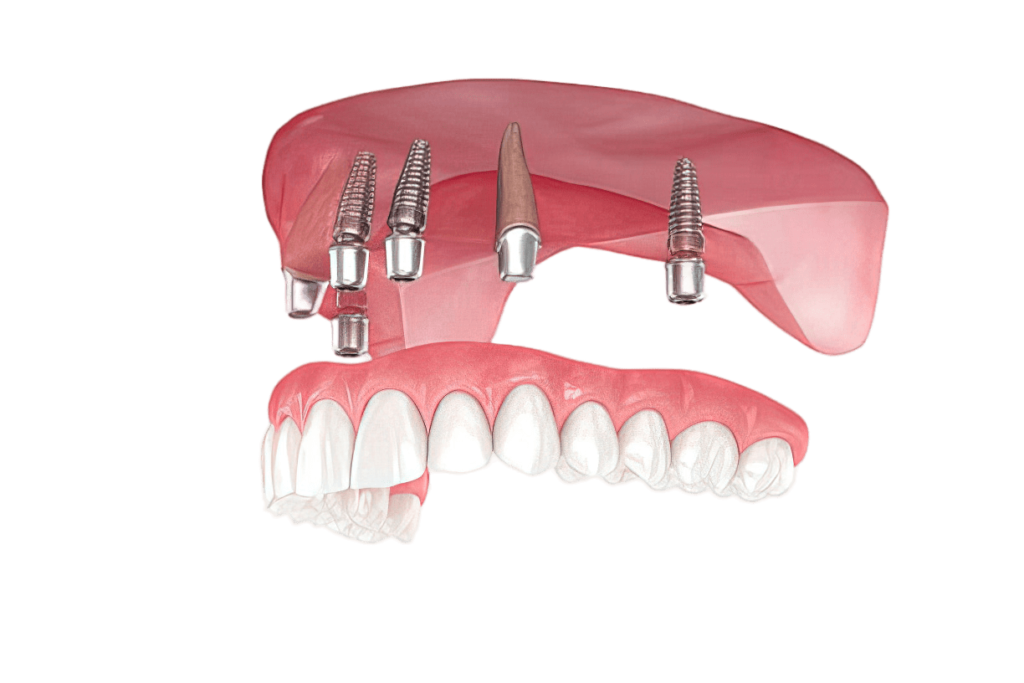All-on-4 Implants in Toronto, Canada
When considering All-on-4 Implants in Toronto, We encourage you to consult Dr Maziar Shahzad Dowlatshahi at once. As the Top Oral surgeon in Toronto, Dr Dowlatshahi is the most experienced dental surgery expert.
Moreover, All-on-4 dental implants are a type of dental implant procedure involving four dental implants to support a full arch of upper or lower teeth. The implants are placed at specific angles and locations in the jawbone to provide optimal support for the dental prosthesis, which is typically a fixed bridge or denture.
Benefits of All-on-4 Implants
This type of implant procedure can be a good option for people who have lost all of their natural teeth and are looking for a more permanent and stable solution than traditional dentures. The All-on-4 procedure can typically be completed in just one day, and it allows patients to eat, speak, and smile with confidence.
- Improved stability and function: Because All-on-4 implants use four strategically placed implants to support a full arch of teeth, they provide better stability and function than traditional dentures. It can make it easier to eat, speak, and smile with confidence.
- Reduced treatment time: The All-on-4 procedure can typically be completed in just one day, compared to traditional dental implant procedures, which may require multiple surgeries and a longer healing time.
- Enhanced aesthetics: All-on-4 implants can provide a more natural-looking smile, as they support a full arch of teeth that are custom-made to match the shape, size, and colour of your natural teeth.
- Increased comfort: Because All-on-4 implants are securely anchored in the jawbone, they are typically more comfortable than traditional dentures, which can sometimes slip or move around in the mouth.
- Improved oral health: All-on-4 implants can help to preserve the jawbone and prevent bone loss, which can occur when natural teeth are missing. It can help to maintain the natural shape of your face and support overall oral health.
Procedure of All-on-4 implants in Toronto
The procedure for All-on-4 dental implants in Toronto typically involves the following steps:
- Initial consultation and planning: During the initial consultation with Dr Dowlatshahi, He will examine your mouth and take x-rays to determine if All-on-4 implants are a good option for you. The Dr Dowlatshahi will also work with you to create a treatment plan tailored to your needs.
- Preparation of the jawbone: If your jawbone is not thick enough to support the implants, you may need to undergo a bone augmentation procedure to prepare the site for the implants.
- Placement of the implants: During the surgery, the Dr Dowlatshahi will make small incisions in the gums and carefully place the implants in the jawbone at specific angles and locations. The implants will be left to heal and integrate with the bone for several months.
- Attachment of the dental prosthesis: Once the implants have fully healed, the dentist will attach the dental prosthesis (usually a fixed bridge or denture) to the implants. The prosthesis will be custom-made to match your natural teeth’ shape, size, and color.
- Follow-up care: After the procedure, you must visit the Our Clinic regularly for follow-up care and check-ups. The dentist will monitor the implants and the surrounding tissue to ensure they are healing properly.

Is it a safe procedure?
Overall, a All-on-4 tooth implant is a safe and effective replacement for a missing or damaged tooth. If you are interested in this procedure, consulting with a qualified and experienced dental professional in Toronto is important. They will be able to assess your oral health and provide you with personalized treatment options to help you achieve a healthy, beautiful smile.
Instructions of All-on-4 Implants in Toronto
Post-Operative Instructions
- Do not smoke
- Maintain good dental hygiene
- Run necessary errands the week before oral surgery
- Avoid medications that thin blood a week prior to surgery
- Have a friend or family accompany you in the day of your appointment
- Brush and floss and make sure that your teeth are clean
- Eat breakfast and lunch on the day of surgery.
- Be sure to wear comfortable, open collared, loose clothing
Post-Operative Instructions
- Do not spit
- Do not use a drinking straw
- Do not smoke
- Keep fingers and tongue away from the surgical area.
- Use ice packs on the surgical area (side of face) for the first 24 hours
- For severe pain, use the medication prescribed to you.
- After the first post-operative day, use a warm salt water rinse
- Your diet should consist mainly of soft, easily swallowed foods
Which is better All-on-4 or Denture?
All-on-4 dental implants and dentures are prosthetic devices used to replace missing teeth. However, there are several key differences between the two:
- Stability and function: All-on-4 implants are securely anchored in the jawbone, which provides better stability and function than dentures, which can sometimes slip or move around in the mouth. It can make it easier to eat, speak, and smile with confidence.
- Aesthetics: All-on-4 implants can provide a more natural-looking smile, as they support a full arch of teeth that are custom-made to match the shape, size, and colour of your natural teeth. On the other hand, dentures may not look as natural and require adhesives to keep them in place.
- Comfort: All-on-4 implants are typically more comfortable than dentures, which can cause irritation or discomfort in some people.
- Oral health: All-on-4 implants can help to preserve the jawbone and prevent bone loss, which can occur when natural teeth are missing. Dentures do not provide the same level of support for the jawbone.
Overall, All-on-4 dental implants may be a better option than dentures for people looking for a more permanent, stable, and comfortable solution to replace missing teeth. However, the best option will depend on individual factors such as the jawbone’s health and the mouth’s overall condition. A dentist can help you determine which option is right for you.
All-on-4 Dental Implants in Toronto - FAQ
The cost of All-on-4 Dental Implants depends the product you choose. It may include the surgery for its placement, all the components, and the implant crown. Please Consult of more info
All-in-4 implants are verified to stand the test of time. Data shows they can stay for 20 years or longer with the right care. The implant posts should never need to be replaced, yet, your denture will undergo daily activity and might need to be replaced
No, most health insurance policies do not provide coverage for any dental treatment. However, some policies may provide limited coverage for certain treatments, such as accidents or preventive care. Additionally, many private insurance companies offer stand-alone dental plans that provide more comprehensive coverage for dental services. In Canada, some health insurance plans offer coverage for certain services under an Out-of-Province Dental (OPD) plan.
No, Local anesthesia will numb the nerves covering the dental implant area. With numbed nerves, you can expect not to feel any pain during your dental implant procedure.
It really depends on the individual situation and what the patient and dentist determine is the best option. Both single tooth dentures and dental implants have their own advantages and disadvantages.
Dental implants are a more permanent solution for replacing a missing tooth. They are surgically inserted into the jawbone, where they fuse with the bone and act as a replacement for the missing tooth’s root. This provides a strong and stable base for the false tooth, which is custom-made to match the patient’s natural teeth. Dental implants are a more expensive option and require a longer treatment time, but they can last for many years and often provide a more natural-looking and comfortable solution for missing teeth.
It’s important to consult with a dentist to discuss your options and determine the best course of treatment for you.
The success rate of the dental implant in Toronto, Canada, is generally high and can range from 95-98%, depending on various factors such as the patient’s oral health and the condition of the jaw bone.
